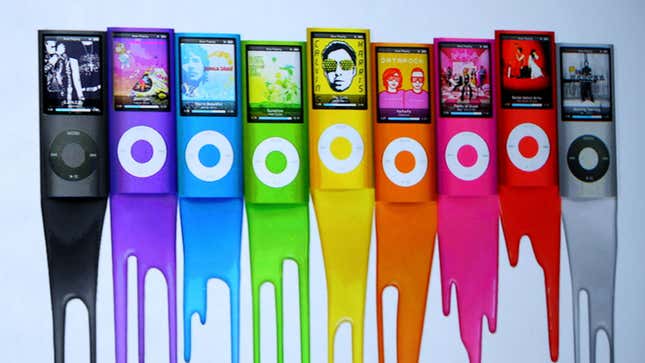
Pour one out for every kid who one-strapped a backpack in middle school, as they’re likely in mourning today. With Apple’s discontinuation of the 7th-generation iPod Touch, announced yesterday, it’s official: the iPod is dead.
Ostensibly, the iPod was a music device, meant to digitize song libraries and move listeners away from the limitations and galactically better sound quality of physical media. (Whether such a shift was good for the music industry is, of course, another story.) But over its many iterations, the iPod also heralded another revolution: that of mobile gaming.
Once upon a time, mobile gaming consisted of playing Brick or Snake on your parents’ dusty Nokia. And sure, following its 2001 launch, the iPod—which literally featured a shoddy port of Brick following the device’s 2001 launch—had a similar landscape for a while. Over the next few years, the offerings grew, but not by much. In 2006, EA released iPod versions of minted classics like Sudoku and Solitaire. Kaplan, the for-profit educational behemoth, released a series of SAT prep study courses (to which I can only say: lol). Compared to other mobile gaming devices of the era, like, say, the Nintendo DS, the iPod was hardly revolutionary.
Then came the iPod Touch.
First released in 2007, the iPod Touch totally reimagined the iPod’s design. Rather than a brick with a wonkily controlled track wheel, the iPod Touch looked a lot like its contemporary, the iPhone: sleek, rectangular, affixed with a glass touch screen that coated its entire silhouette. Unlike the iPhone, you couldn’t use an iPod Touch to summon and instantly lose the courage to dial up your crush from algebra. But if you had a Wifi connection, you could download a bunch of games that’d at least distract you during algebra.
And some of the games of the era were truly excellent. Fruit Ninja! Tap Tap Revenge! Words with Friends! Temple Run practically created, or at least widely popularized, a new genre, laying the groundwork for truly terrific endless runners like Alto’s Odyssey. Personally, I had a soft spot for Doodle Jump, a platformer that cast you as an elephant (?) wearing a jetpack. The visuals, stylized to look like a lined paper notebook, are inked in memory. But for me, at least, it was also an early introduction to the wider world of leaderboards.
Some games, quality aside, went on to become legit cultural behemoths. Angry Birds spawned a feature film, along with crossovers with Star Wars and Transformers, and a gazillion other spin-offs. (My grandmother once bought me an Angry Birds bath mat, presuming that, seeing as I like video games, I must like Angry Birds, the only video game.) The impact was undeniable.
And so, news of the iPod’s death set off a spirited wave of nostalgia in Kotaku’s Slack this afternoon.
Staff editor Lisa Marie Segarra shouted out pretty much all of the games listed above, and further pointed to the iPod as a catalyst for the indisputable Candy Crush craze. She also praised the tilt controls that came with some games, which were “so innovative at the time. Or at least it felt like it.”
“What a time to be alive,” added staff writer Zack Zwiezen. “I truly miss the older era of the App Store. … No doubt we have great stuff today, but I can’t help but long for those simpler times when I drank fake beer and played with knock-off lightsaber apps.”
The times are indeed less simple. Rather than the handful of must-play options, Apple’s gaming ecosystem is bigger than ever, as major games—everything from blockbusters like XCOM and Genshin Impact to indie sleeper hits like Sayonara Wild Hearts and Baba is You—make their way to the App Store. Apple Arcade, a subscription service that grants access to a library of games, is slowly becoming an essential scouting ground for under-the-radar gems. (Many Apple Arcade games eventually make their way to Nintendo Switch or traditional consoles, where they become ‘legitimized’ in the eyes of the hardcore player, something that goes on to obscure mobile game origins.)
But every time one of these once-essential devices gasps its final breath, I find myself struck at the finality—how everything, no matter its apparent staying power or cultural impact, is ephemeral, a fleeting moment you don’t realize was fleeting until it’s gone. As they say: Wouldn’t it be nice to recognize you’re living in the good times when you’re actually living in the good times? I think so.
Anyway, yeah, RIP to the iPod. You had a good run. You’ve left a good legacy. And to really get all mid-2000s: Thnks fr th Mmrs.